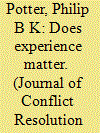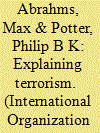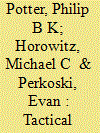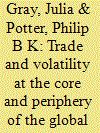|
|
|
Sort Order |
|
|
|
Items / Page
|
|
|
|
|
|
|
| Srl | Item |
| 1 |
ID:
077419


|
|
|
|
|
| Publication |
2007.
|
| Summary/Abstract |
This article demonstrates that the probability of an international crisis involving the United States declines as a presidential administration gains time in office. This finding invalidates three widely held theories about the relationship between the American democratic cycle and foreign policy that (1) there might be a honeymoon period immediately following election in which new presidents are unlikely to become involved in foreign crises, (2) presidents might systematically use the ``rally round the flag'' effect to bolster their electoral prospects, or that more generally, (3) foreign policy might be primarily tied to the democratic constraints of the electoral cycle. This finding also stands in partial contrast to recent work suggesting that, globally, leadership experience does not influence the likelihood of a militarized interstate dispute, while leader age does. The differing conclusions are the result of both the unique American case and the differing formulations of conflict
|
|
|
|
|
|
|
|
|
|
|
|
|
|
|
|
| 2 |
ID:
123621


|
|
|
|
|
| Publication |
2013.
|
| Summary/Abstract |
Conventional wisdom holds that large margins of electoral victory contribute to presidential power. How does this variation in power impact U.S. foreign policy? I argue here that presidents who win elections by a substantial margin authorize the use of substantial military force more regularly, but do so at the expense of personal diplomacy and low-level crisis engagement. This distinction stems from the variation in the external constraint that other political actors place on these policies. New presidents who are empowered by a decisive election have more leverage and are therefore better able to pursue otherwise constrained foreign policies such as the use of major force. In contrast, those who win by smaller margins have less political capital and are forced disproportionately to the less constrained arenas of diplomacy and crisis intervention.
|
|
|
|
|
|
|
|
|
|
|
|
|
|
|
|
| 3 |
ID:
139798


|
|
|
|
|
| Summary/Abstract |
Certain types of militant groups—those suffering from leadership deficits—are more likely to attack civilians. Their leadership deficits exacerbate the principal-agent problem between leaders and foot soldiers, who have stronger incentives to harm civilians. We establish the validity of this proposition with a tripartite research strategy that balances generalizability and identification. First, we demonstrate in a sample of militant organizations operating in the Middle East and North Africa that those lacking centralized leadership are prone to targeting civilians. Second, we show that when the leaderships of militant groups are degraded from drone strikes in the Afghanistan-Pakistan tribal regions, the selectivity of organizational violence plummets. Third, we elucidate the mechanism with a detailed case study of the al-Aqsa Martyrs Brigade, a Palestinian group that turned to terrorism during the Second Intifada because pressure on leadership allowed low-level members to act on their preexisting incentives to attack civilians. These findings indicate that a lack of principal control is an important, underappreciated cause of militant group violence against civilians.
|
|
|
|
|
|
|
|
|
|
|
|
|
|
|
|
| 4 |
ID:
158378


|
|
|
|
|
| Summary/Abstract |
Militant groups, like all organizations, carefully consider the tactics and strategies that they employ. We assess why some militant organizations diversify into multiple tactics while others limit themselves to just one or a few. This is an important puzzle because militant organizations that employ multiple approaches to violence are more likely to stretch state defenses, achieve tactical success, and threaten state security. We theorize that militant organizations respond to external pressure by diversifying their tactics to ensure their survival and continued relevance, and that the primary sources of such pressure are government repression and interorganizational competition. We find consistent support for these propositions in tests of both the Global Terrorism Database (GTD) and Minorities at Risk Organizational Behavior (MAROB) data sets. We bolster these findings with an additional specification that employs ethnic fractionalization in the first stage of a multi-process recursive model. These findings are relevant not only for academic research but for policy as well. While it is difficult for countries to anticipate the character of future tactical choices, they may be able to anticipate which groups will most readily diversify and thereby complicate counterterrorism efforts.
|
|
|
|
|
|
|
|
|
|
|
|
|
|
|
|
| 5 |
ID:
118179


|
|
|
|
|
| Publication |
2012.
|
| Summary/Abstract |
Researchers typically assume that economic openness increases volatility. But the conventional empirical shorthand for economic openness (trade as a share of overall income) fails to account for crucial distinctions in the way that states trade. States that are deeply incorporated into the core of the international trading network have very different experiences than states at the periphery with fewer, more marginalized trading partners. This article demonstrates that a position at the core of the international trading system rather than the periphery actually diminishes volatility. Thus, a country's position in the world economy can, independently of its overall volume of trade, moderate the risks of exposure to international markets. To demonstrate how this distinction might impact political outcomes and future scholarship, we show that this reduction in volatility allows governments to minimize compensation to their domestic publics.
|
|
|
|
|
|
|
|
|
|
|
|
|
|
|
|
|
|
|
|
|